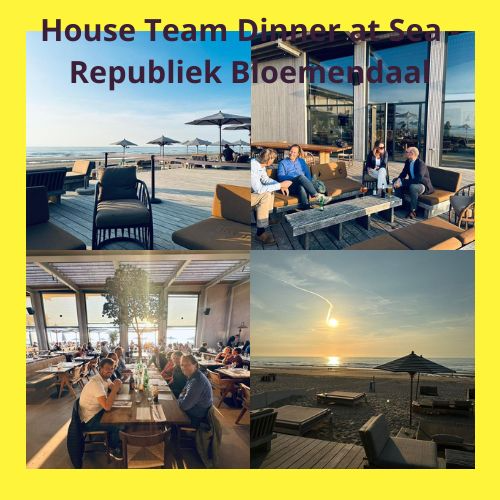House Talk Online - May 23, 2024
House Talk Online – May 23, 2024 – 2 to 3 p.m.
About 'Transformative trends: navigating Automation and AI in corporate legal departments' - speakers Mike Sanders, Reid Cram and Jacob Regan (NetDocuments) - powered by NetDocuments
Our House Talks Online is to inspire General Counsels and Heads of Legal to work on Innovation and Impact in Legal. This House Talk Online focuses on 'Transformative trends: navigating Automation and AI in corporate legal departments'.
There are a lot of changes in Tech in Legal right now. How do you, as General Counsel or Head of Legal, ensure that you keep up to date and know what is possible with AI, for example? What do the current changes mean for the daily affairs of your legal department?
That is why we are organizing the House Talk Online on Thursday, May 23 from 2 to 3 p.m. on 'Transformative trends: navigating Automation and AI in corporate legal departments' with speakers Mike Sanders (Director, Solutions Engineering), Reid Cram (Senior Product Marketing Manager) and Jacob Regan (Account Executive) at NetDocuments. They will show how you can organize and accelerate legal work with AI, among other things.
Would you like to be present? Please register via the button below:
Interview Saskia Deknock, Head of Legal & Compliance Nestlé Belgilux and the Netherlands
How can House support a company like yours with flexible legal services?
In a short interview, one of our valued clients, Saskia Deknock, Head of Legal & Compliance Nestlé Belgilux and the Netherlands, revealed her experience with our legal services and working with our senior legal counsel. A glimpse of that here:
A quick response in busy times: “House took a leap of faith for us with an interim senior legal counsel, who was able to start quickly and was immediately available when the need was urgent.”
The perfect match: "House is not just about legal skills, but also about the right match with our company and our needs. Every assignment is unique and requires careful coordination. House offers that."
Sector-focused expertise: “We worked with a legal professional who already had experience in our industry and therefore understood our specific needs and the dynamics of our sector. The speed and efficiency with which she acted made the difference - and the personal connection with Maaike made it all even better."
Speed and responsiveness: “House is more than just a legal service provider: they listened to our needs and were able to respond perfectly. The immediate response and personal attention we received only strengthened our confidence in their services.”
Are you looking for legal support that suits your company? We are here to help and are always open to a conversation. Legal for tomorrow!
House: 5 years!
House: 5 years!
Wow, to be honest, we were (also) surprised ourselves. This year House has been around for 5 years! House was founded in 2019 based on the vision that flexible legal work can be different and better, especially for the self-employed corporate lawyer, working from freedom and expertise for great companies and brands in a sustainable way. Customers can count on 'on-demand' legal support from enterprising and friendly legal counsel.
Our founder Maaike Roet has worked for many years as an employment law attorney-partner and as an interim corporate lawyer. House was created from her experiences and the drive to show companies that legal business support does not only have to be complicated, expensive and long-term, as well as the need to help other independent corporate lawyers with great assignments.
Over the past 5 years, House has grown into the 'go-to' partner for flexible corporate legal advice with a steady House Team of 30 legal counsels and a carefully selected flexible team of 100 independent corporate lawyers. We're going to celebrate that this year!
Legal Team Session – Strategy
Written by Paul Drop – Outside General Counsel
Strategy for Legal
Every now and then the strategy for the coming years is on the corporate agenda. The entire company is working on it. Also Legal. This is the time to look back, to reflect on the question: why do we exist as a legal department? To make plans and to determine that improvements are needed. The latter is good. Dissatisfaction, unrest, 'it grates'; This is all breeding ground for lasting change.
WHY?
First back to the question: WHY is Legal there? Do you have the answer? Unfortunately, the day when Legal is no longer necessary has not yet arrived everywhere. And in the meantime, the perception of Legal is still often: the 'no-department', the 'rubber stamp' or 'a cost item'. It is my experience that Legal and therefore also in-house lawyers still regularly struggle with the question of whether they are allowed to be there and how they can gain influence. And not everyone manages to get past those questions. Yet it is important that Legal knows WHY it is there in the company. This not only contributes to the self-confidence of the Legal Team and the individual corporate lawyers, but also helps to express the importance of Legal internally. And the latter ultimately makes a bottom-line contribution for the company.
HOW?
And if Legal knows why she is there: HOW do we do that? I recently spent a day working with a Legal Team on the question of HOW, but from a different perspective. This perspective assumes that legal knowledge is sufficiently available (and will be further trained). Furthermore, it presupposes a number of skills that must be present in a team of collaborating legal advisors. So not only knowledge of the law, but also skills in the field of communication, effective collaboration, management, process improvement and use and application of the right technology. Those skills are useful throughout the company.
Of course, not everyone is a fully developed expert in all these areas. But those skills are often represented in a team, and otherwise it is a reason for recruitment. Whether it is at starting level or whether there are experts in the team is not immediately important. Everyone is at least a beginner. Then there is a basis for speaking with experienced colleagues or even experts within the company about a specific issue that requires legal assistance. This way, the in-house lawyer can also determine when a problem is more than just legal and the in-house lawyer also knows when another specialist needs to be called in to solve it. Furthermore, every skill offers opportunities for improvement. A good analysis at personal and team level is then important. There are various useful tools available for this.
And now?
Legal has a unique position in a company: the legal department is better situated than external lawyers and is (potentially) located where a lot of interaction with the business takes place. In addition, the in-house lawyers (and the Legal Team) have a well-stocked toolbox of skills that provide solutions to legal problems within the context of the company's business and strategy. In short: in-house has so much more to offer. It is high time to market that.
Do you also want to get started with your Legal Team? I would love to work with you on our Legal Team Sessions. Contact us at: info@house-legal.nl to set up the strategy of your Legal Team together!
House Talk Online - March 1, 2024
House Talk Online – March 1, 2024 – 11-12 a.m.
About Futureproof Governance – speaker Mildred Hofkes (NieuwBestuur) – powered by NetDocuments
Our House Talks Online are to inspire General Counsels and Heads of Legal to work on Innovation and Impact in Legal. This House Talk Online is all about Futureproof Governance. There are many positive changes happening in Legal right now. How do you, as General Counsel or Head of Legal, ensure that you also include the voice of the future in your advice to management? What do the current changes mean for the daily affairs of your legal team?
That is why we are organizing the House Talk on Friday, March 1 from 11 a.m. to 12 p.m.
Online about Futureproof Governance with speaker Mildred Hofkes (NieuwBestuur). Mildred shares with us her extensive experience in stakeholder management and future-proof governance. She provides the participants with examples from her own practice of how companies are making the move towards sustainability and are subsequently able to accelerate this by involving their stakeholders. Mildred also explains the YoungBoards concept on how organizations can give younger generations an important voice in sustainable and inclusive decision-making. Finally, Mildred will take the participants through the theme of transparent governance and translate this into (mandatory) sustainability reporting in the field of CSR, Corporate Sustainability Reporting Directive CSRD and ESG. In short, Mildred's House Talk guarantees an energetic and educational session!
Would you like to be present? Please register via the button below:
About the usefulness of purchasing conditions for IT services
Written by Martijn Berk – Senior legal counsel – IT, data & technology
About the usefulness of purchasing conditions for IT services
Lawyers are expensive
There are a number of prejudices about lawyers. I am used to the temperature dropping by a few degrees as soon as I enter the meeting room. In my opinion, this is (of course) wrong, especially because I prefer to work constructively and keep the interests of both parties in mind.
A prejudice that I regularly encounter is that lawyers are expensive. Now you can argue that a good lawyer costs money and limits risks and saves money in the long term, but the fact remains that a lawyer costs money. And even with a reasonable hourly rate, costs can quickly add up, so a contract assessment takes at least a few hours. And I always advise against quickly drawing out the main points: after all, the danger (or the genius) always lies in the details.
To save legal costs, the entrepreneur who purchases an IT service often agrees to the (general) terms and conditions of the other party. The entrepreneur negotiates the price and delivery date himself and the conditions are signed unread.
Save by drawing up general purchasing conditions
However, there is a middle ground between a tailor-made assessment of an agreement on the one hand and signing it unread on the other, namely: by drawing up general purchasing conditions. General purchasing conditions (GPC) are the mirror image of the supplier's general terms and conditions. By using AIV yourself, in many cases it is not necessary to engage a lawyer.
As soon as you purchase a service, you send the AIV with the message that it applies to the possible agreement to be concluded. In many cases, the supplier - who wants to bring you in as a new customer - will agree to the AIV or make a counter-proposal on a number of items. And even if the supplier makes a counter-proposal, the involvement of a lawyer will be limited. If all goes well, your lawyer knows the set and can quickly assess whether the counterproposal is reasonable. And also in larger organizations, with their own buyers and lawyers, it pays to use AIV; If the supplier accepts the AIV, the buyer no longer needs to visit the legal department.
Two tips
Two more tips about drawing up and using General Purchasing Conditions:
1. First of all, it is important that the AIV you use matches the service or product you are purchasing. Larger organizations often have a set of AIV that are suitable for purchasing pens and copy paper. Attention is often also paid to staff who temporarily carry out work on location. But the purchase of an IT service (for example the implementation of a software package or the purchase of a SaaS service) differs materially from the purchase of pens and has specific areas of attention that you want to address in advance in your AIV. For example, you can consider recording process agreements if the supplier works according to the Agile methodology. You can also arrange how any errors in the software that come to light after acceptance are dealt with. Are these at the expense of the supplier or not?
2. Secondly, before you instruct your lawyer to draw up the AIV, it is important that you consider how one-sided (or not!) you want the conditions to be. If you choose to have a set of GTC drawn up, where all provisions are drafted in such a way that they are primarily to your advantage (for example, that the supplier is maximally liable for any damage, the supplier is responsible for any delay - even if caused by you has been caused - and that you have the option to terminate the contract for any minor shortcoming), it is likely that the supplier will not accept these conditions. Instead, the supplier is likely to make counter-proposals to many of these provisions and the intended result of time and cost savings will not be achieved. In some cases it may be legitimate to use one-sided conditions, but often a set of reasonable conditions gives a better result.
If you have any questions about this: I or the other senior legal counsel at House will of course be happy to help you draw up an appropriate AIV. Contact us at: info@house-legal.nl to keep your legal costs within limits!
House Team Dinner at Sea – Republiek Bloemendaal
House Team Dinner at Sea – Republiek Bloemendaal – September 14, 2023
Written by Maaike Roet - CEO & Founder House.
On a sunny Thursday, September 14, our annual House Team Dinner at Sea was held at Republic Bloemendaal. With our House Team and new House Team members. Looking back, gratitude, catching up, sparring and looking ahead. Thanks for being there, House Team. Legal for tomorrow!
This article was prepared by Maaike Roet
House Talk Online - September 29, 2023
House Talk Online – 29 september 2023 – 11-12 uur.
Leadership in Legal – spreker Pepijn Paanen (Euronext Amsterdam)
Our House Talks Online are to inspire General Counsels and Heads of Legal to work on Innovation and Impact in Legal. This House Talks Online focuses on Leadership in Legal. There are currently many developments in Legal. How do you ensure that you show leadership in this as General Counsel or Head of Legal? What do the current developments mean for the daily affairs of your legal team? Don't you also want to be an inspiring and innovative leader?
That is why we are organizing the House Talks Online on this topic on Friday, September 29 from 11 a.m. to 12 p.m. with Pepijn Paanen (Head of Legal and Regulatory affairs at Euronext Amsterdam) as speaker. Pepijn will take us through the process of managing successful legal departments, achieving goals and the associated personal leadership. Pepijn will sketch examples from the world of top sports for illustrative purposes. It will be an interactive session where we can share best practices with each other.
Would you like to be present? Please register via the button below:



